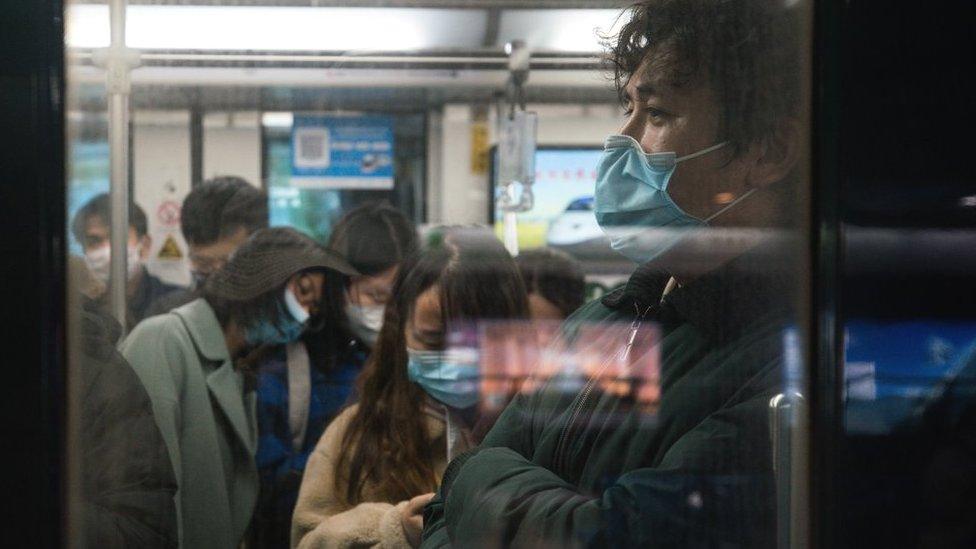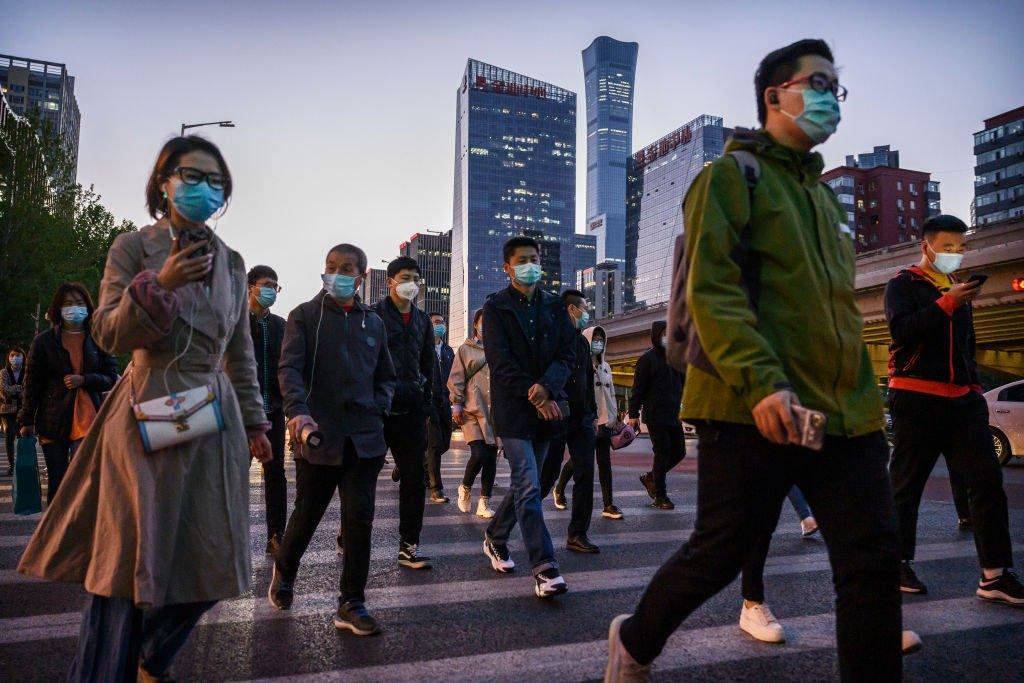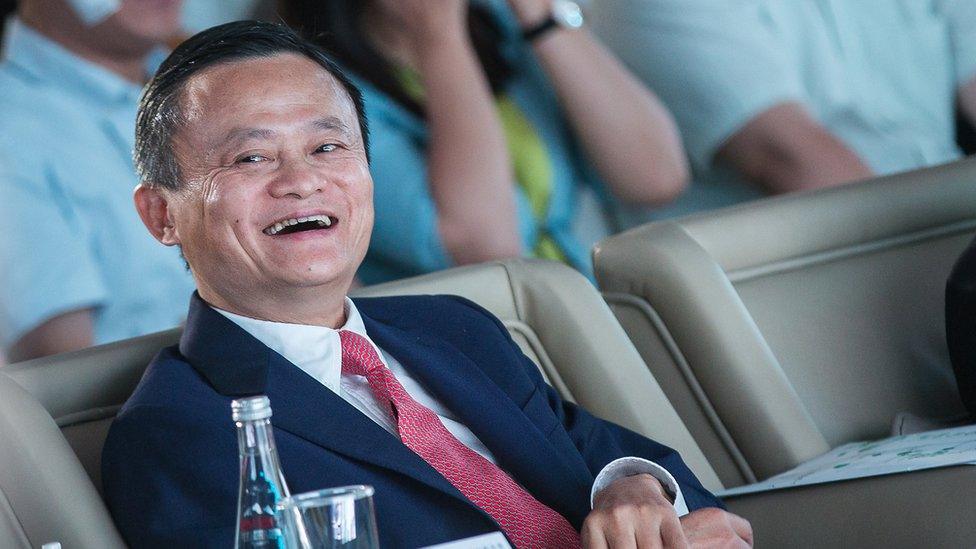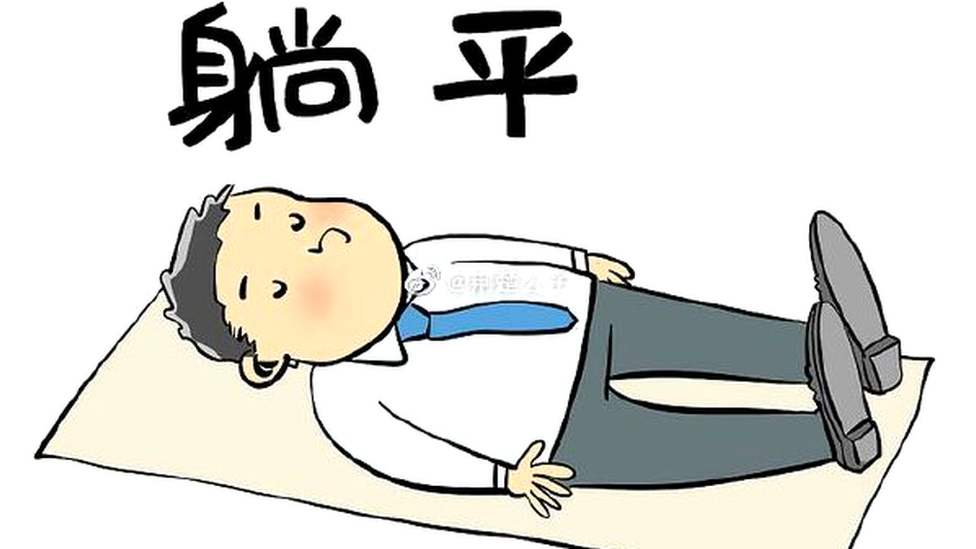The buzzwords reflecting the frustration of China's young generation
- Published

Many young people in China are finding it harder to reach some of their goals
In China, the rat race begins almost the minute you are born - from getting into a good school to getting that prestigious job. But millions now want to break free of this cycle, with two words shedding a light on the frustration felt by the younger generation.
When Sun Ke graduated from college in 2017, he went to Shanghai to pursue a dream shared by many from his generation - a good career, a car, perhaps even a house.
The 27-year-old didn't expect it to be very difficult. His parents managed to start from scratch on their own, and now own several properties in their hometown, a small town near Shanghai.
However, when he started his own restaurant business in 2018, Sun Ke soon realized that big franchises and delivery platforms already dominated the market. He was too late to the race.
"To compete with others on delivery apps, my business partner and I had to take money out of our own pockets to waive the delivery fee and give discounts to clients. And the real money makers are still those big franchises."
After two years, he ended up losing more than 1 million yuan ($156,907, £110,169). Late last year, he shut the business for good.

China is home to some 600 million people whose monthly income is barely 1,000 yuan ($154).
He said his experience was typical of "involution" in China today.
The involuted generation
Originally an anthropological term, "involution", or "neijuan" in Chinese - literally translated to an inward curling - refers to a social concept where population growth does not result in productivity or improved innovation.
Today, the term is broadly used to express a feeling of burn out.
The trend started from the most elite university campuses in the country when pictures of students taking hard work to the extreme went viral on the internet last year. In one of the photos, one student from Tsinghua University was operating on his laptop while riding a bike.
The student was crowned as "Tsinghua's Involuted King", and the idea of involution began trending across China's young generation, resonating especially with millennials born after the 1990s and Gen Z.
On the country's social media platform Weibo, hashtags related to involution have been viewed more than 1 billion times. It was also included in a popular chart of China's top 10 buzzwords last year.

In one of the photos, one student from Tsing Hua University was operating on his laptop while riding a bike
"The young continue to feel if they don't work hard or participate in competitions they will be ousted by society, but they don't see a breakthrough for themselves despite their repeated efforts," said Professor Biao Xiang from the University of Oxford.
"Our parents' generation had their [challenges], but also their opportunities. Everything was new. As long as you had ideas and courage, there was a very good chance of succeeding," said Sun Ke.
The concept is not one that's unique to China. Most developed countries in the world have arguably had a generation that has lived through this period of boom.
But the key difference is that in China, these "golden times" have passed so quickly that it is still fresh in people's memories.
This means the young generation like Sun Ke have witnessed the success of their parents - seeing them build their own wealth from scratch.
"Their parents or some neighbours who are just 10 years older than them could reap that much profit by just going to this business, but now that window has closed, they don't have that possibility anymore," said Dr Fang Xu, a lecturer at the University of California, Berkeley.
Frustration against the rich
China now has the second highest number of billionaires in the world. But it's also home to some 600 million people whose monthly income is barely 1,000 yuan ($154).
The huge disparity has led to an increasing resentment from the young against their employers. And there's a growing sense amongst the young that their struggles aren't understood by those at the top.
Su Mang, a businesswoman and former editor-in-chief of Harper's Bazaar China, received fierce backlash after she said that involution was a "gulf between one's desire and laziness".
She later apologised, but the damage had already been done.
"If bosses could relate to people who work for them, 996 won't exist, neither will involution," one user commented, referring to a culture in China's business world of working 9am to 9pm, six days a week.
"Capitalists should just shut up," others wrote.

Jack Ma is an advocate of this 996 culture
Billionaire Jack Ma previously advocated this 996 culture, calling it a "blessing". This, plus the investigations his company Alibaba was going through, led his reputation to fall from role model to a "blood-sucking capitalist", as some have described him online.
'Lie flat' - an option not allowed
But another concept has now emerged - that of "lying flat" or "tang ping" in Mandarin.
It began after a forum user stated that although he had not been working for the past two years, he did not see this as a problem - very much going against the traditional definition of success in China.
He argued that there was no need to follow society's ideals.
"Only by lying flat can one become the measure of all things," he wrote - and thus the concept of "lying flat" was born.
The idea behind "tang ping" - not overworking, being content with more attainable achievements and allowing time to unwind - has been praised by many and inspired numerous memes. It has been described as a spiritual movement.
Professor Xiang from Oxford suggested that these trends show the younger generation's desire to "give up meaningless competitions" and a need to rethink the old models of success.
Many young Chinese have echoed the idea of exiting the rat race, but experts say it might be hard for this concept to become widely adopted - as authorities might find it goes against socialist values.
In a speech in 2018, China's President Xi has said the new era "belongs to those who work hard", and "happiness can only be achieved through great endeavours".

Motorcycle delivery workers wearing protective facemasks wait for orders along a street in Shanghai
State media have also taken offence to the concept of "lying flat". In one article published on Guang Ming Daily, a newspaper specialising in cultural matters, the author criticized the "lie-flatists" as possibly harmful to the country's economy and society as a whole.
In another commentary from Nanfang Daily, the writer called the latest trend "unjust and shameful".
However, Dr Xu adds that she does not see these trends going away.
"Sadly I would say the next five to ten years will still be like this, because there's no technological big evolutions industrial-wise, so there's no new fields for them to explore and grow," Dr Xu added. "The result is involution will continue."
In the West, the young generation may choose to live off the grid or live a minimalist lifestyle, but in China - these aren't options, she added.
"There's only one path, one sanctioned lifestyle," she said. "That is the fundamental mindset that makes lying flat an issue."
Related topics
- Published6 May 2021

- Published3 June 2021
